#Literary Legend
Text
Edgar Allan Poe: Unraveling the Mastermind who Revolutionized Horror
Shaina Tranquilino
October 28, 2023

When it comes to horror literature, there is one name that stands out above all others – Edgar Allan Poe. Born in 1809, this enigmatic American author left an indelible mark on the world of literature with his dark and mysterious tales. With his unparalleled ability to delve into the depths of human psyche, Poe's work has forever transformed the genre of horror, inspiring countless authors and filmmakers over the years.
Poe's Unique Style:
Edgar Allan Poe was a master of creating an eerie atmosphere through vivid descriptions and chilling narratives. His stories were often characterized by themes of death, madness, and the macabre, leaving readers on the edge of their seats. Unlike other writers of his time, Poe refused to shy away from exploring the darker aspects of human nature.
The Birth of Detective Fiction:
Apart from his contributions to horror fiction, Poe is also hailed as the pioneer of detective fiction. In fact, his character C. Auguste Dupin was a precursor to famous detectives like Sherlock Holmes or Hercule Poirot. Stories such as "The Murders in the Rue Morgue" and "The Purloined Letter" showcased Poe's keen analytical mind and introduced readers to deductive reasoning long before it became popular.
Psychological Depth:
One aspect that sets Poe apart from other authors is his exploration of psychological depth. He delves into the darkest corners of human consciousness and exposes our deepest fears and desires. This penetrating analysis resonates with readers even today, making his works timeless classics.
"The Tell-Tale Heart," for example, showcases how guilt can drive a person insane. The narrator's obsession with a single eye reveals not only their own deteriorating mental state but also serves as a metaphor for humanity's hidden sins lurking beneath the surface.
Legacy in Poetry:
While primarily known for his short stories, Poe's impact on poetry is equally significant. His haunting and melancholic verses have become celebrated works in their own right. Poems such as "The Raven," "Annabel Lee," and "The Bells" continue to captivate readers with their lyrical beauty, evocative imagery, and exploration of themes like love, loss, and the inevitability of death.
Influence on Contemporary Horror:
Edgar Allan Poe's influence on contemporary horror cannot be overstated. Countless authors, filmmakers, and artists draw inspiration from his unique style and themes even today. The dark atmospheres, psychological depth, and twists that have since become synonymous with the genre owe a great debt to this literary pioneer.
Poe's Legacy Continues:
Despite facing personal tragedies throughout his life and enduring financial struggles, Edgar Allan Poe left an indelible mark on literature. His work continues to resonate with audiences worldwide, captivating us with its eerie charm and immersive storytelling.
Edgar Allan Poe forever changed the world of horror through his masterful writings. His ability to explore the depths of human fear and obsession has influenced countless authors who followed in his footsteps. From his chilling tales of suspense to his introspective poetry, Poe remains an icon whose legacy will continue to haunt our collective imagination for generations to come.
#Edgar Allan Poe#Horror#Horror Revolution#Gothic literature#Master of Horror#Poe Influence#Dark Tales#Macabre Genius#Literary Legend#Dark Poems#Dark Literature#Dark short stories
13 notes
·
View notes
Text
#james baldwin#literary genius#literary legend#legend#author#activist#pro black#literary icons#icon#lgbt#lgbtq#pride icons#history#life#lessons#lesson#life lessons#life lesson#lessons in life#lesson in life#listen#talk to people who listen#who will listen#no but listen#reality#real shit#true shit#genius#poetic#poetic soul
3 notes
·
View notes
Text
Jane who? Austen?? Hmm, never heard of her, sorry
I only know @wrylywriting 🤷🏻♀️✨️
10 notes
·
View notes
Text
in honor of louise glück’s passing, here is a poem that i think about constantly and that has pulled me through some of the most difficult moments in my relationship with my parents

8K notes
·
View notes
Text
I wonder if we've always been crazy about blorbos... I imagine we've always frothed at the mouth over little guys. Over Hamlet, over Lancelot, whatever. Humanity is nothing if not deranged blorbo-lovers. It's a bit comforting.
773 notes
·
View notes
Text
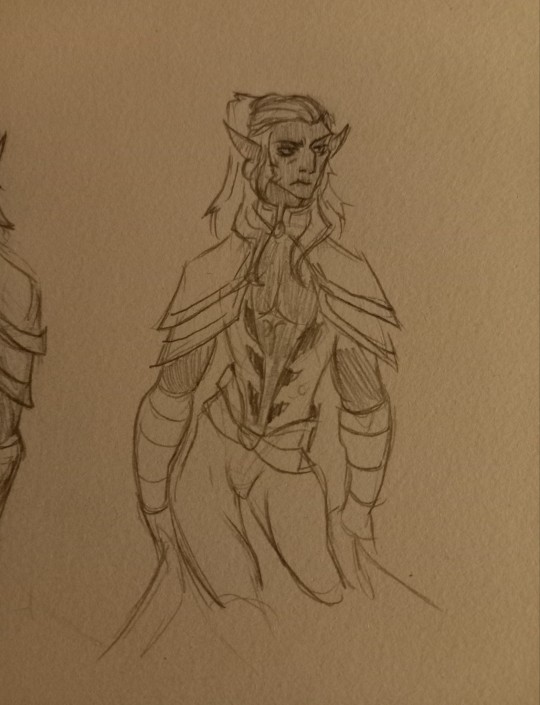
Quick lil sketch of what I like to imagine dad do'urden looks like
#drow#zaknafein do'urden#legend of drizzt#dnd#forgotten realms#yes i burrowed the outfit from the comic cause it's so slay#otherwise i hate how he looks in there#him and all the other male drow literary why they look like they eat steroids#yes i know it's probably the artstyle and yes zak is described as big and strong#but i like this more
74 notes
·
View notes
Text

o_O
#prince wu#mako#legend of korra#lok#drawing#digital art#sketches#some clean some not#completely unrelated… BUT#I feel like coworkers in Mako’s department give him book recommendations (some cause a level of disgust about the literary choices made)#is that based off my own experiences with book clubs?…. maybe….
37 notes
·
View notes
Text
Okay since this has suddenly blown up over the last 3 days, I want to make a post discussing what I meant by it. Because I have shit to say.
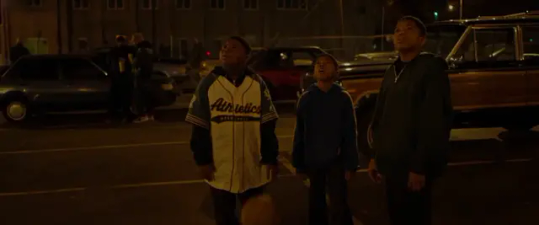
Fiction doesn’t affect reality, but fiction can affect people. For better or for worse.
You might read a book and some random line might inspire you enough to want to live by it.

You might play a video game and come away questioning about something you’ve never really thought about before.

(also, just to get this out of the way)

And in regards to the original post— yes, there have been cases in which groups advocating for change have been taken advantage of by bad people. To ignore that would be to ignore history.
But the thing is, that is a real life example. Real people, places, organizations and concepts are and will always be impossible to convey in fictional media because those things are always changing. They are never just black and white, never.
Meanwhile, fiction is different. Whether it’s a book, game, movie, tv show— even the most complex of media will never truly be as “complex” as reality.
Because fiction is written. Scripted, animated. Filmed. Programmed, sculpted, published.
Reality isn’t any of those things. What a person feels, does, says, thinks, isn’t written down, isn’t predestined by some script or line of code— the closest way I can describe it is that it’s dictated by 1,000 hands doing a coin flip at the same time with a 3-sided penny that immediately falls into a hole before a winner can be discerned.
Anyways. I’m off topic.
What I’m trying to get at is that no fictional character has the agency that a real person has. We cannot interview a fictional character and get an idea of how their thought process works, or hell what they had for breakfast or something. No.
Because the extent to which a fictional character, setting, etc. exists— is between the time the opening title fades out and the credits fade in. The time between you clicking new game & when you’ve reached the true ending. When you open page 1 and end page 200.
But like I said. Fiction can have an effect on real people’s minds, for better… or for worse.
You are a viewer who might not know any better. You might not be well informed on history, and may easily have your mind shaped by whatever you consume.
You turn on a show, plug into a game, open a book, grab your popcorn and watch a movie. And in this media, there’s a character, or maybe multiple characters— and their cause is laid out, plain and simple.
Maybe they’re apart of some oppressed group, fictional or nonfictional, who wants change in society. Who wants their oppressors to just stop oppressing them, and has been pushed to the extent in which the only way their voices can be heard is through violence.
Most likely they are already “antagonists” of the narrative, but that their goals are treated as being… “understandable”… by either that narrative, or the main cast.
At least, to the extent that these protagonists can still gleefully beat the shit out of them without anyone batting an eye.
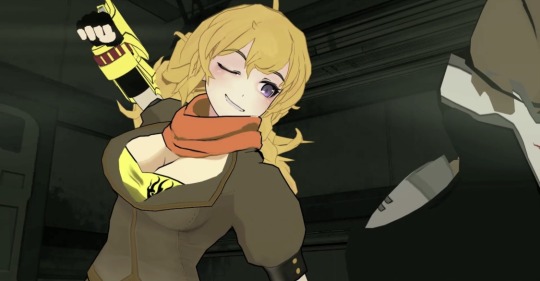
And you continue watching, playing, reading, etc. And most likely at this point, the narrative has begun to portray these particular antagonists in a different light.
Perhaps they’ve begun upholding the goals they said they had less and less. They’re becoming more violent just for the sake of it.

And also at this point it is likely that the narrative is… silently… treating this character’s/group’s initial goals with less and less favorability. Key word, silently.
“Oh, this character is fighting back against oppressors… but now they’re killing people? How evil, surely pushback against oppressive groups can never be achieved.”
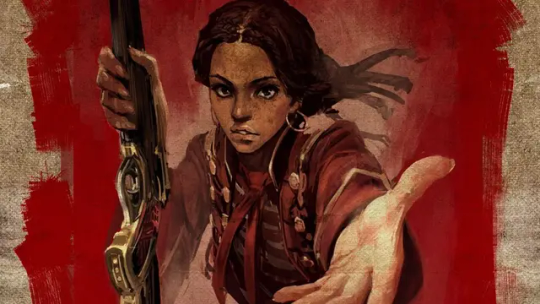
“Oh, this fictional group/organization wants to fix their society? Their society which has displaced them without care? …Oh, but they’re bombing buildings now, surely we could never take their displacement seriously.”
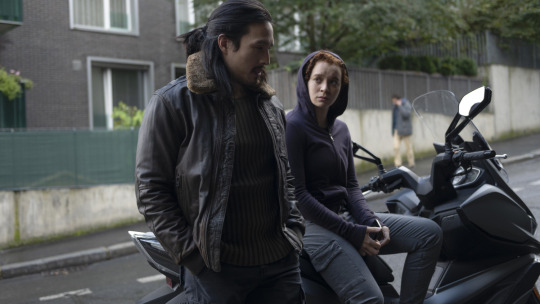
And eventually as you near the end of this narrative, the slippery slope has been slipped upon.
In an instant, the character(s) whose goals were at least given a shred of sympathy at the beginning of this story
suddenly end up killing thousands of people.
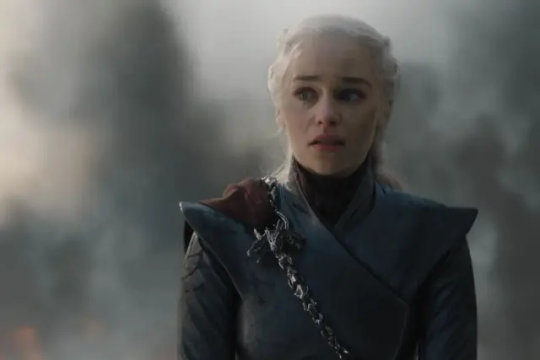
Or maybe, they suddenly turn out to be apart of the very group they’re trying to combat against.
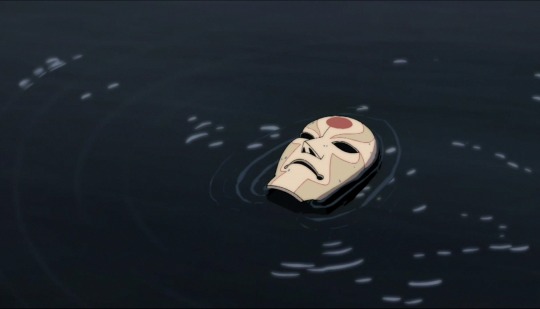
Or maybe, they’re a Holocaust survivor.
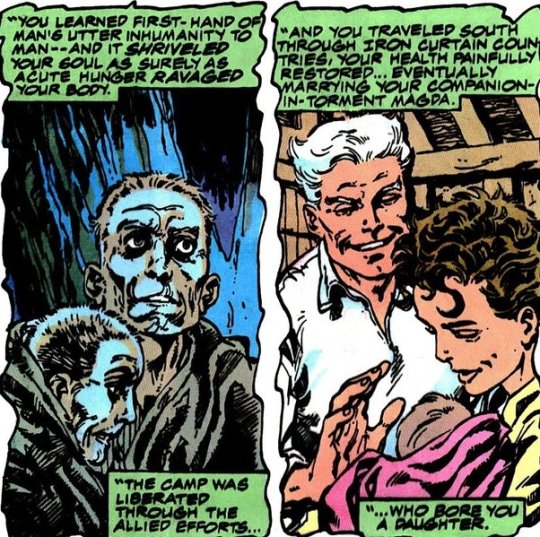
Another thing you might see the narrative start to do at this point is suddenly reveal the backstory of this character/organization— and most likely, it’s something sad, upsetting, angering.
But it rings hollow, it’s meant to ring hollow. Because when you give a character(s) you’ve already assigned the hatesink role to, that backstory will be disregarded in the instant if never explored upon. And in most instances… it’s not explored upon. It’s shock value.
And while this might not be the case for the character above, as my knowledge of X-Men is fairly limited… I can say that this is the case for another character:
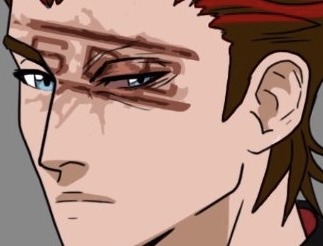
This character was branded.
This character who, in universe, is apart of a fictitious minority group, is revealed to have been branded and enslaved by a company run by his oppressors, with outside material implying this was possibly done while he was a minor.
Good thing this was revealed after he turned out to be a genocidal terrorist & abuser! Who cares that he was branded? I bet whoever did it just really “let him have it.” (Writer’s own words!)
Please don’t look up the fact that Adam is a Hebrew name! Please also don’t realize that the initials he was branded with & the company he was enslaved by had a German name!
And most likely at this point, the character(s) have two routes to go down.
They die graphically. Maybe not in a big bloody gorebath, but they’re not given the same amount of liberty in death that other villains in this media might get. Bonus points if it’s on-screen. However, you’ll have the main character “mourning the loss” of them, or rather, what they could’ve been, if only they’d not gone so far!


2. Or just take what I said in 1 but without the last sentence.

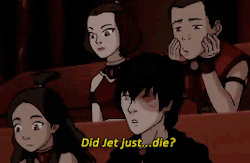
And then, credits roll. You’ve reached the true ending. Page 200. Final episode. Whatever.
And if you’re the viewer I mentioned at the beginning of all of this, who might not know any better—
who takes what they see in fiction and applies it to the world around them…
You’ll think. “Are people/groups like that in the real world this dangerous, too?”
(especially if it’s used in media meant for children.)

But anyways.
It’s propaganda dipped in flashing lights or likable characters. It’s propaganda that’s hidden under cool set pieces, beautiful cinematography, “good writing.”
I wanna reiterate what I said earlier in this post.
“What I’m trying to get at is that no fictional character has the agency that a real person has. We cannot interview a fictional character and get an idea of how their thought process works, or hell what they had for breakfast or something. No. Because the extent to which a fictional character, setting, etc. exists— is between the time the opening title fades out and the credits fade in. The time between you clicking new game & when you’ve reached the true ending. When you open page 1 and end page 200.”
When a character advocating for justice or freedom or something noble and good, suddenly ends up murdering babies or bombing hospitals, they loose the “advocating for justice or freedom” part. They’ve shifted from one part of their written arc to the next.
We only see what the narrative allows us to. So when the narrative only allows us to see these character(s) do horrific things, we subconsciously interpret that these things were their main goals all along.
And most often, this kind of narrative will prove you right on that front. Sadly.
And again. If you’re “that viewer”— you’ll apply that logic to the world around you. You’ll grow into that logic.
You’ll see news reporters regard people protesting a genocide as “needing to be put in insane asylums” and nod your head. You’ll see podcasters tout a group fighting against police brutality and racism as terrorists and agree with them.
Maybe I’m being exaggerative. It’s 12 am here. But what I’m really trying to emphasize here is that this trope is propaganda.
Yes, there are real world examples of bad people taking over good organizations. But when you present a scenario like that in fiction, you subtract the nuances and complexities that real life has.
And it becomes propaganda. Propaganda that no one is immune to, and anyone can be susceptible to.
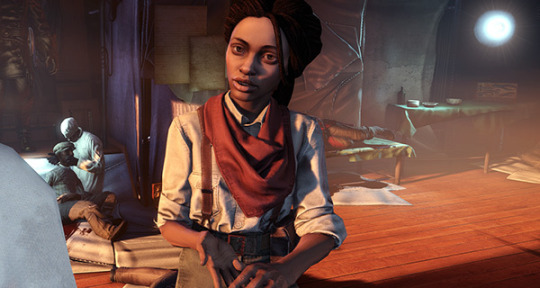
It’s propaganda when Bioshock’s Daisy Fitzroy, a black revolutionary & former slave who wanted freedom for her people, has her goals invalidated time & time again and is portrayed as just as evil as the system itself.

It’s propaganda when The Legend of Korra’s Zaheer, who wanted to destroy the authority figures of the world so that all people could be free, ends up torturing the main protagonist on screen.
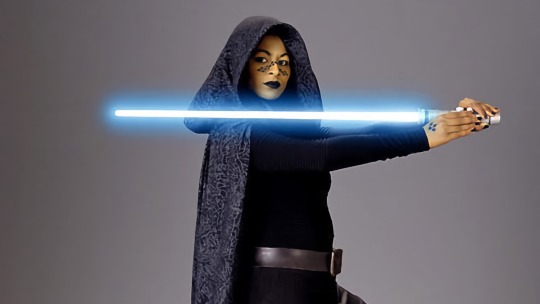
It’s propaganda when Star Wars’ Barriss Offee, who wanted the Jedi to return to being peacekeepers, not warmongers, and then bombing their temple. (Didn’t help that she’s heavily Muslim coded.)
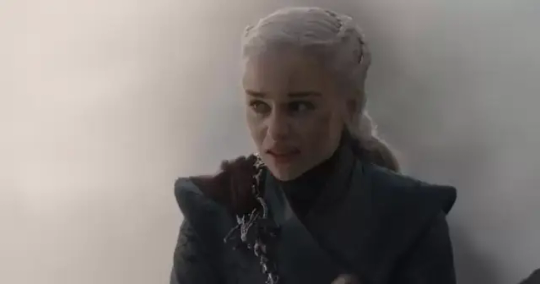
It’s propaganda when Game of Throne’s Daenerys Targaryen goes from being a victim of abuse who wanted to liberate the oppressed and destroy their oppressors, to becoming a murderer of thousands because “she was mean to some slavers.”

It’s propaganda when RWBY’s White Fang, a group made up of members of an in-universe minority race, are never once given a shred of sympathy, becoming nothing more than evil terrorists wanting to take over the world, and are even blamed as “the cause of their own racism.”
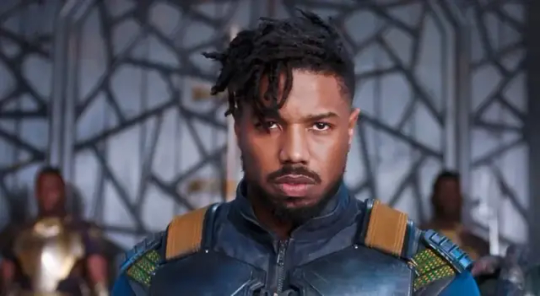
It’s propaganda when Marvel’s Erik Killmonger wants to continue what his father wanted and empower black people around the world to fight against their oppression, “overthrow their oppressors”, but then just… actually wants to conquer the entire world.

And it’s propaganda when Magneto, a Jewish man, a survivor of the holocaust… is written to be an advocate for genocide.
TL;DR:
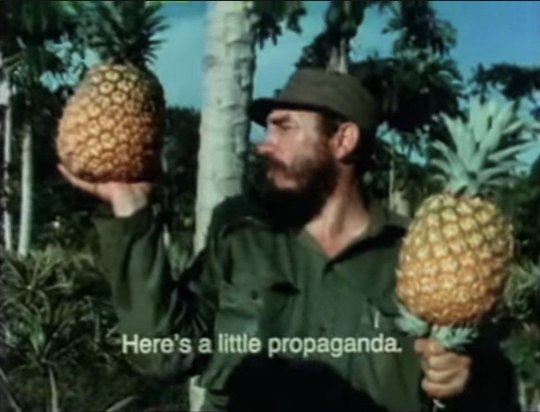

#tumblr#let them fight#no one fight#marvel#erik killmonger#x-men#magneto#social justice#fiction#literary analysis#literary criticism#meta#analysis#rwby#bioshock#star wars#avatar#avatar the legend of korra#the legend of korra#the last airbender#game of thrones#long post#image heavy#will likely improve upon the image id’s later#dragon age#snd if I worded any of this wrong please lmk.
32 notes
·
View notes
Text
youtube
Ichabod's story, from beginning to end.
HEADLESS: A SLEEPY HOLLOW STORY
A new 10-part series by Shipwrecked Comedy inspired by The Legend of Sleepy Hollow
Written & Created by Sean Persaud & Sinéad Persaud
Directed by William J. Stribling
CAST
(in order of appearance)
Rip Van Winkle - James Tolbert
Diedrich Knickerbocker - Jon Cozart
Ichabod Crane - Sean Persaud
Douffe Martling - Joanna Sotomura
Matilda Bishop - Sinead Persaud
Kat Van Tassel - Mary Kate Wiles
Judy Gardenier - Krystina Arielle
Eugene Trousers - Curt Mega
Ramona Trousers - Kim Whalen
Geoffrey Crayon - Parvesh Cheena
Trevor Trinkets - Christopher Higgins
Lucretia Lazenby - Sarah Grace Hart
Brom Bones - Gabe Greenspan
Tripp - Joey Richter
Cal - Corey Lubowich
Blair - Brian Rosenthal
The Headless Horseman - Tom DeTrinis
Christa Pierson - Audrey Grace Marshall
Verla Wolfson - Ginny Di
Henri - Jason Huber
Officer Baader Meinhof - Corey Dorris
Captain "Gravy" Davy Crowbones - Matthew Mercer
Max Lee - Jimmy Wong
Devlyn Versace - Lee Newton
Judge Pringle - Julia Cho
Anne Tarry - Lauren Lopez
Bruce McConnell - Dan Mintz
Paulie Tahoe - Ryan Garcia
Jonathan Oldstyle - Tom Lenk
with Felicia Day as Henrietta Hudson
And featuring John Rubinstein as Baltus Van Tassel
#headless series#shipwrecked comedy#headless: a sleepy hollow story#the legend of sleepy hollow#sleepy hollow#washington irving#modern adapation#headless#literary adapation#sean persaud#sinead persaud#mary kate wiles#sarah grace hart#jon cozart#paint#krystina arielle#joanna sotomura#curt mega#kim whalen#joey richter#lauren lopez#matt mercer#matthew mercer#ginny di#corey dorris#corey lubowich#tom lenk#tom tetrinis#felicia day#lee newton
303 notes
·
View notes
Text

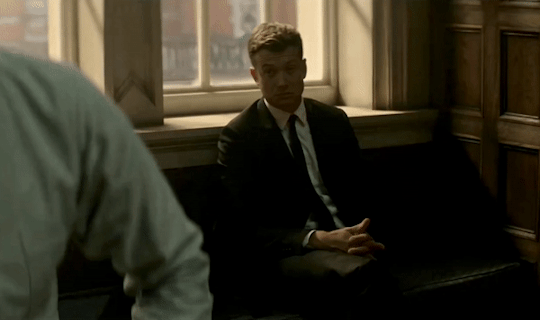
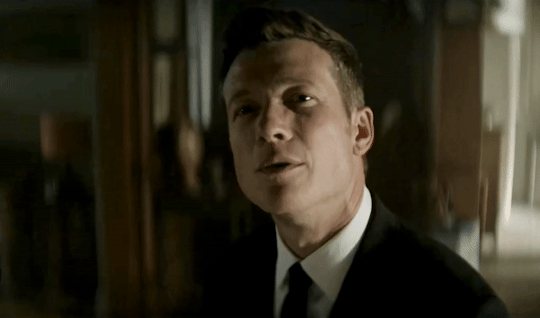
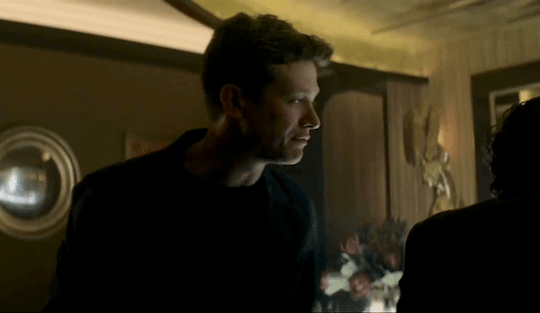
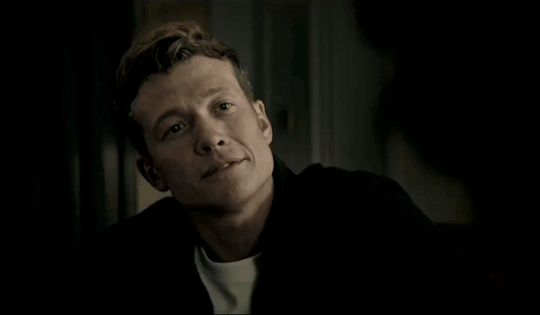
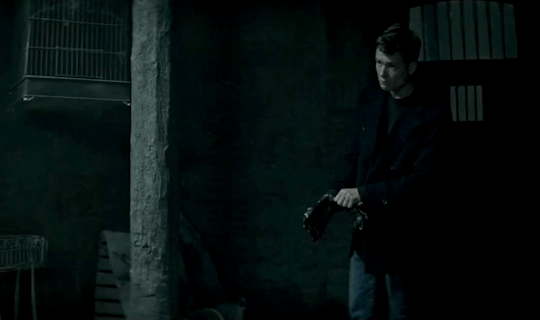
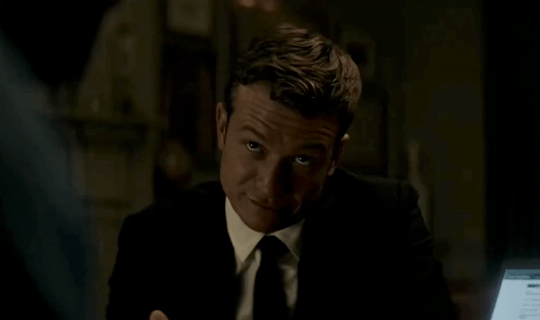
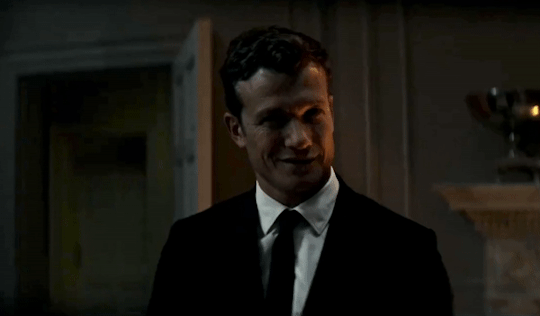
Random soft!psycho!Rhys moments that I love
“If only there were evil people somewhere insidiously committing evil deeds, and it were necessary only to separate them from the rest of us and destroy them. But the line dividing good and evil cuts through the heart of every human being. And who is willing to destroy a piece of his own heart?” – Aleksandr Solzhenitsyn
#rhys montrose#ed speleers#you netflix#you season 4#you edit#you gifs#joe goldberg#goldrose#my gifs#how can rhys be such a smol baby and simultaneously a cynical monster#it is beyond me#i suppose it's all thanks to ed's wonderful acting#and lovely face :)#by the way this is one of my favourite quotes on good vs. evil#aleksandr solzhenitsyn#what a literary legend
95 notes
·
View notes
Text
The idea of liminal space is an extremely important concept in Twilight Princess. If you aren't already aware, a liminal space is a transitional space, such as a place between two extremes, or a place that serves to connect two places--think of stairwells, hallways, waiting rooms, vehicles, parking lots, or airports. These are spaces that, while meant to be used, are not meant to be occupied for long. You don't hang out in a waiting room for the sake of it; you wait in a waiting room in order to transition to the doctor's office. It is because of this that many of us perceive liminal spaces to be eerie or unsettling--we are occupying a space that feels in-limbo, somewhere outside the pace of everyday life.
Writers and filmmakers of horror have been using this to their advantage for hundreds of years, utilizing liminal spaces as settings to build up dread for both the characters and the viewer without ever needing to explain why. Begin looking for liminal spaces in horror and you'll see them everywhere--i.e., the entire concept of the Korean zombie film Train to Busan, which is set almost entirely on a single train. Liminal spaces do not have to be physical spaces, however, but can also be metaphorical spaces--look no further than The Strange Case of Dr. Jekyll and Mr. Hyde, where one man's body is the space occupied by the two extremes of the morally upright Jekyll and the deplorable Hyde (granted, this is a little bit of a simplistic reading of the character--but the concept is still in-play).
Twilight Princess, while not a "horror game," per-se, dips into the tropes that define the genre--including liminal space. Twilight--the place of transition between day and night--is itself a liminal space. Making this concept into an intrusive, almost parasitic force than encroaches itself onto the everyday world is deeply unsettling to us as the player. It is forcing liminality onto places that are not meant to be liminal, creating places of transition that transition to nowhere. Places in the game that have been overtaken by Twilight are empty, strangled into silence that feels like it should be building up to something, but never does. Perhaps it is because of this liminality that all people caught in Twilight are turned into spirits--they are unable to continue with their lives, stuck in the moment when Twilight took over, but unable to ascend to an afterlife. Whenever Link enters this liminal space, he is forced into a form that is not his, in which his normal capabilities are limited. It is only when he leaves the liminal space that he is himself again.
However, despite all this, nearly everyone who has played the game agrees that, despite all of this, there is a certain beauty about Twilight. It is fascinating in its eeriness--just like liminal spaces. Have you ever met anyone who loves airports (of which I am one)? It's that same sort of appeal. There's a strange dichotomy between how unsettling and how fascinating it is to occupy these spaces that escape definition.
And here, inevitably, we come to the tragedy of Midna.
Because, she, of course, is a being of Twilight. As one of the Twili, the princess of the Twili, she is defined by liminality. She comes to Hyrule as an outsider, almost something alien, something that does not belong--she is liminal. And she knows it. While her vendetta against Zant and her desire to eliminate his influence is highly personal, there is no doubt that, by the end of the game, she recognizes that Twilight is a corruptive force to the land of Hyrule. But she also realizes in the end how much she cares about Link--while they began their adventure barely tolerating one another, they ended it with mutual trust, and it's not too much of a stretch to say mutual attraction. However, despite all of this, Midna knows the nature of her existence. The two of them aren't meant to occupy the same space for long. Perhaps this is why, in the end, despite the tragedy of it all, she shattered the mirror behind her.
Because Midna was liminal. Link was not.
#overanalyzing video games with literary theory?#on my blog?#it’s more likely than you think#maybe my half-finished writing degree is paying off for something#legend of zelda#loz#twilight princess#midlink#loz midna#linkeduniverse#linked universe#midna x link#lu midna#twilight x midna#lu twilight
632 notes
·
View notes
Text
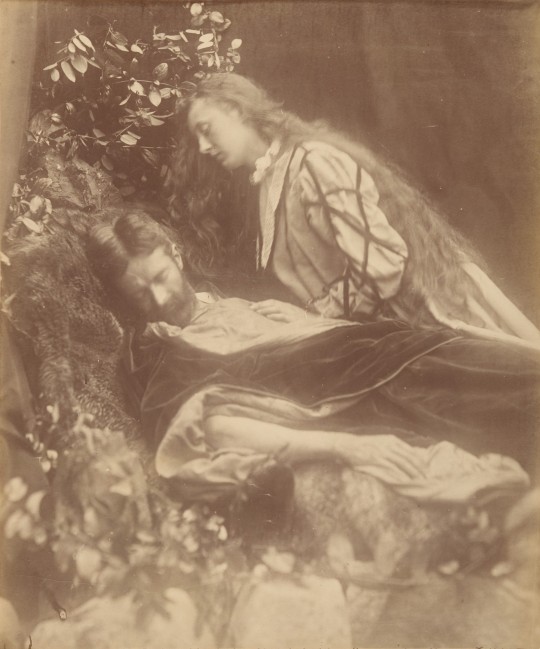
Gareth and Lynette, Julia Margaret Cameron, 1874
#photography#vintage photography#vintage#julia margaret cameron#1870s#1874#19th century#19th century photography#british#female artists#women artists#sepia#albumen print#literary art#arthurian legend#mythology#le morte d'arthur
19 notes
·
View notes
Text

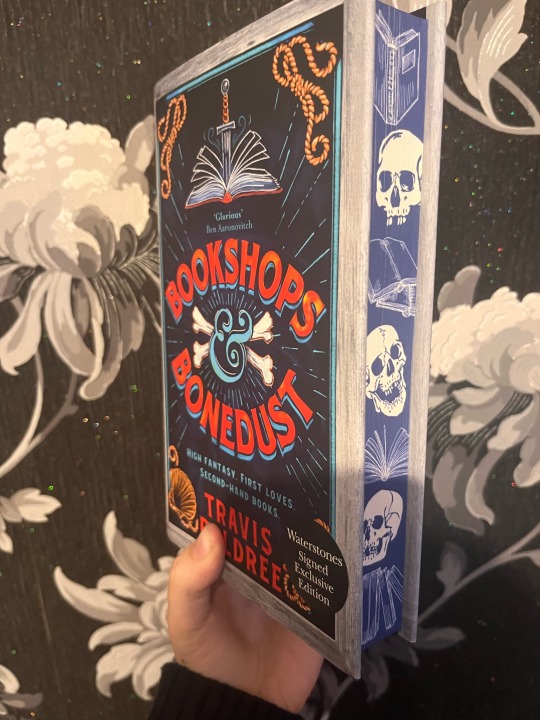
Absolutely loved my ARC so you know I had to get the hardcover to match my Legends & Lattes!
#shazzy’s literary mess#booklr#Travis Baldree#legends and lattes#bookshops and bonedust#fr the shadow of my sisters birthday balloon
24 notes
·
View notes
Text
thinking thoughts about ryan ross currently
#ryan ross supremacy#afycso#i can't verbalize just how much of a legend he is. his literary genius is absolutely undeniable
35 notes
·
View notes
Text
Will I ever stop posting about Headless? About the greatest miniseries of all time? About supporting women-led projects? About independent creators? About the perfect spooky Autumn vibes? About the Emmy-worthy acting in it? About the phenomenal writing? About how EVERY. SINGLE. CHARACTER. is the best character? About one of the best original mysteries I've encountered in a long time?
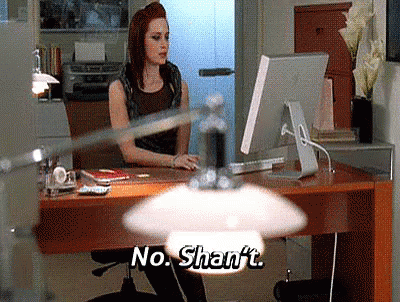
So, on that note, go watch it here:
#shipwrecked comedy#headless series#headless: a sleepy hollow story#shipwrecked#headless#youtube#the legend of sleepy hollow#sleepy hollow#indie filmmakers#content creator#support artists#autumn vibes#autumn aesthetic#literary adapatation#literary webseries#gothic literature#gothic horror
91 notes
·
View notes
Photo

It’s June 10th! So here is Port reading the Lusiads, which is basically a fanciful retelling of the first sea voyage to India with roman mythology in the mix, with Venus being the protector of the Portuguese and Bacchus trying to foil them.
And yes, I realise I clearly like water and history coming out of books lol
#my art#aph portugal#hws portugal#broooo my headache is killing meeee#trevo said Port is looking at the naked lady and YEAH OK IT WASN'T INTENTIONAL but Venus was there for him ok she deserves the attention#i wanted to add more but you know....you know#so we have the two gods and viri4thus and ter3sa and h3nry and afons0 h3nriques#and then the story of eg4s mon1z o aio and ofc p3dro and in3s#4damastor is obligatory and m4griço and his buddies#and the island of loves which is just so funny. trust c4mões to reward his sailors by getting them laid in an island full of nymphs#'god would approve of this' and it did the inquisition approved it good for him#and a lil c4mões up there cos according to legend he saved the manuscript of the poem after a shipwreck#by holding it up while swimming with one arm#anyway i love c4mões and i love that he bitches about getting no respect in this...the national epic. love it#as you can see i prefer to focus on the literary side of today hehehee
249 notes
·
View notes